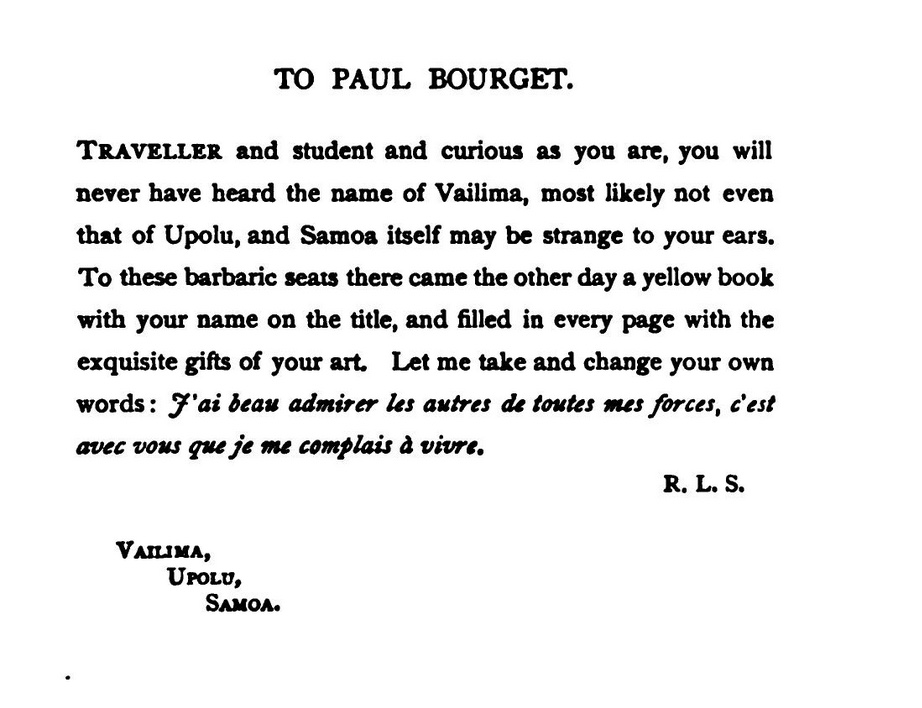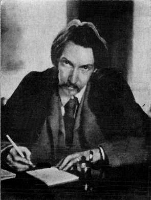Archive for May 2023
Paul Bourget writes to Stevenson
A post contributed by Katherine Ashley
In 1891, Henry James sent Stevenson a copy of Paul Bourget’s Sensations d’Italie (1891). The book gave Stevenson a ‘literal thrill’ and he quickly requested more of his works. Bourget (1852-1935) was a poet, novelist, and playwright, but today he is mainly read by literary historians for his astute study of fin de siècle cultural malaise, Essais de psychologie contemporaine (1885). He was also, like Stevenson, a traveller, and it is fitting that Stevenson’s introduction to him was via Sensations d’Italie, a book about Bourget’s travels in Tuscany, Umbria and Puglia.
The reasons for Stevenson’s enthusiasm for Sensations d’Italie are explored in an earlier post; a direct result of his reading is that he dedicated Across the Plains (1892) to Bourget.
To Stevenson’s consternation, Bourget did not immediately respond to the compliment. He complained to Sidney Colvin: ‘ain’t it manners in France to acknowledge a dedication? I have never heard a word from le Sieur Bourget, drat his impudence!’. He was even more to the point in a letter to James. Although the tone is good-humoured, there is an element of hurt and annoyance:
I thought Bourget was a friend of yours? And I thought the French were a polite race? He has taken my dedication with a stately silence that has surprised me into apoplexy. Did I go and dedicate my book to the nasty alien, and the ’n’orrid Frenchman, and the Bloody Furrineer? Well, I wouldn’t do it again; and unless his case is susceptible of Explanation, you might perhaps tell him so over the walnuts and the wine, by way of speeding the gay hours. Seriously, I thought my dedication worth a letter.
As it turns out, Bourget’s case was indeed ‘susceptible of Explanation’: work had prevented him from replying. The excuse seems reasonable, since Bourget spent the first months of 1892 in Rome, which resulted in his novel Cosmopolis (1893). He also published two other books around this time, La Terre promise (1892) and Un scrupule (1893).
Bourget’s contrite reply finally came, enclosed in James’s next letter to Stevenson. The manuscript is kept at Harvard University. It is transcribed and translated here.
Londres, le 3 août 93
Monsieur et cher confrère,
Je suis si coupablement en retard avec vous pour vous remercier de la dédicace du beau livre en tête duquel vous avez mis mon nom que je n’en finirais pas de m’en excuser. Le démon de la procrastination—ce mauvais génie de tous les imaginatifs—m’a joué des tours cruels dans ma vie. Il aurait commis le pire de ses méfaits s’il m’avait privé de la précieuse sympathie dont témoignait votre envoi—et venant de l’admirable artiste que vous êtes, cette sympathie m’avait tant touché. Peut-être trouverez-vous le mot de cette énigme de paresse dans une existence qui six mois durant, l’année dernière, a été celle d’un manœuvre littéraire esclavagé par un engagement imprudent—ce qui n’est rien lorsqu’on a le travail // facile, ce qui est beaucoup quand on ne peut pas « faire consciencieusement mauvais » comme disait je ne sais plus qui.
J’aurais voulu aussi, en vous remerciant, vous dire combien j’aime votre faculté et vision psychologique et comme il m’amuse en vous lisant de trouver entre ce que vous exprimez et ce que je sens sur des points analogues de singulières ressemblances d’âme. Croyez que, malgré mon silence, cette fraternité intellectuelle fait de vous un ami éloigné auquel je pense souvent. Je me réjouis de savoir par Henry James que vous avez retrouvé la santé sous le ciel où vous êtes réfugié. Que je voudrais pouvoir espérer qu’un jour nous nous rencontrerons, et que nous pourrons de vive // voix échanger quelques idées et parler des choses que nous aimons également ! Mais vous avez vraiment choisi l’asile presque inaccessible et je songe avec mélancolie que j’ai failli, voici des années, aller frapper à votre porte à Bournemouth. C’était un peu après vous avoir connu intellectuellement, et un autre démon, celui de la défiance, qui fait qu’on recule devant les rencontres les plus désirées, m’en a empêché. Voilà, Monsieur, beaucoup de diableries dans un petit billet qui devrait être toute chaleur et toute joie puisqu’il me permet de vous prouver ma gratitude d’esprit. Recevez-le comme une poignée de main bien sincère et croyez moi votre vrai et dévoué ami d’esprit.
Paul Bourget
Transcription: Katherine Ashley, Antoine Compagnon and Richard Dury
.
London, 3 August 1893
My dear fellow,
I am so shamefully late in thanking you for the dedication to the fine book at the front of which you put my name, that I’ll never be done asking for forgiveness. The demon of procrastination—that evil genie of all creative people—has played cruel tricks in my life. He will have perpetrated his worst mischief if he has deprived me of the precious sympathy demonstrated by your dedication—and coming from the admirable artist that you are, this sympathy has touched me greatly. Perhaps you’ll find an explanation for my mysterious slowness in an existence that for six long months last year was that of literary labour enslaved by unwise commitment—which is nothing when the work comes // easily, but which is much when one cannot ‘in good conscience do bad work’, as someone whose name escapes me once said.
In thanking you, I’d also like to tell you how much I appreciate your abilities and psychological vision, and how it amuses me, when reading you, to find a singular likeness of temperament between what you express and what I feel on analogous points. Know that, despite my silence, this intellectual fraternity makes of you a distant friend of whom I often think. I’m delighted to learn from Henry James that you have regained your health under the skies where you have taken refuge. How I’d like to hope that we’ll meet one day, and that we’ll be able to exchange ideas in // person and speak of things that we both love equally. But you’ve truly chosen an almost inaccessible sanctuary, and I think with wistfulness that years ago I almost knocked on your door in Bournemouth. It was shortly after getting to know you intellectually, and I was prevented by another demon, the demon of no-confidence that makes us back away from the most desired encounters. That, sir, is a lot of devilry for a short note that ought to be all warmth and pleasure, since it allows me to show my gratefulness. Please accept it as a sincere handshake indeed and consider me your true and devoted like-minded friend.
Paul Bourget
Translation: Katherine Ashley
.
See also the former post on Katherine Ashley’s recent study Robert Louis Stevenson and Nineteenth-Century French Literature
.
.
.
.
.
.
Stevenson and Dante
A post contributed by Robert-Louis Abrahamson
In his 1878 essay ‘Pan’s Pipes’, Stevenson describes those who ‘hold back the hand from the rose because of the thorn, and from life because of death’ as ‘tooth-chattering ones’. The phrase ‘tooth-chattering’ posed a problem when compiling the notes for my edition of Virginibus Puerisque. Like so many other phrases in the essays, it seemed to be lifted or adapted perhaps from the Bible, or Shakespeare, or some French idiom, but I could find no sources. Richard Dury and I pondered this problem, and the best we could come up with was: ‘an invention of Stevenson’s based on the ancient “kindly ones” (that is, the Eumenides, or Furies)’.
Nearly five years after the edition of Virginibus Puerisque came out, I can supply what I think is a better note. In Canto 3 of Dante’s Inferno, the souls waiting to be transported across the Acheron quake when they hear Charon’s words of doom (‘I come to conduct you nelle tenebre eterne, in caldo e in gelo, into eternal darkness, into fire and ice’). These are the souls who have lost all the goodness life had offered them. Forlorn and naked, changing colour, Dante shows them as they dibattero i denti, they chattered with their teeth. These, of course, are the ‘tooth-chattering ones’. In his essay about one mythic story, Pan, Stevenson draws on another myth, Dante’s journey, and if we catch the infernal allusion, we see these ‘recreant[s] to Pan’ in a much darker light.
RLS2024 ‘Intertextual Stevenson’
Ruhr University Bochum, 27–29 June 2024

Organisers: Lena Linne & Burkhard Niederhoff
In “A College Magazine”, Robert Louis Stevenson famously described his literary apprentice-ship as an exercise in imitation: “I have thus played the sedulous ape to Hazlitt, to Lamb, to Wordsworth, to Sir Thomas Browne, to Defoe, to Hawthorne, to Baudelaire, and to Obermann.” The works that were eventually published are hardly less indebted to previous texts than his earlier attempts at literary pastiche. “No doubt the parrot once belonged to Robinson Crusoe. No doubt the skeleton is conveyed from Poe”, Stevenson admits in “My First Book”, an essay on the genesis and the sources of Treasure Island. Some critics have used these self-depre-cating comments, in particular the “sedulous ape”, to support their claim that Stevenson was a derivative writer lacking in originality. Others, by contrast, have praised him as a precursor of postmodernism who was aware of, and brilliantly exploited, the inevitable intertextuality of all writing.
Many of the papers given at this conference will explore the way Stevenson used, adopted and responded to texts by other writers, and the way other writers used, adopted and responded to texts by him. The term text will be interpreted broadly and papers on film, graphic novels etc. will be welcome.
We also invite comparative papers that engage with analogues or parallels rather than sources and influences, situating Stevenson’s works within a genre or within their nineteenth-century context (e.g. “Stevenson and Wilkie Collins as Writers of Sensation Novels”). Moreover, there is room for theoretical investigations that take their cue from essays such as “A College Magazine” or “My First Book” and analyse Stevenson’s ideas about the genesis and structure of literary texts.
Finally, we will welcome papers that engage with the multiple texts that often lurk behind what is considered a single text; those who are interested in editing Stevenson’s writings could compare different layers or versions of a text and the editorial problems resulting from them. Further creative interpretations of the conference theme are possible and welcome.
Proposals (200-300 words) for twenty-minute papers are warmly invited and should be sent to one of the organisers by November 30, 2023 (lena.linne@rub.de, burkhard.nieder-hoff@rub.de). If you have any questions, please contact the organisers.



